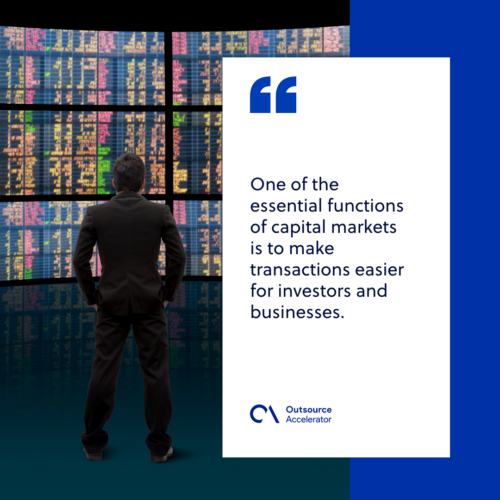Capital Market
Definition
What is the capital market?
A capital market is a marketplace where sellers and consumers trade financial securities such as bonds, stocks, and other derivatives. Many individuals and companies are participating in the buying and selling in capital markets.
There are two standard compositions in capital markets:
- The primary markets
- The secondary markets
The goal of capital markets is to increase transactional efficiency. The capital market provides a venue for companies to trade assets.
Importance of capital markets
One of the essential functions of capital markets is to make transactions easier for investors and businesses. It will be more convenient for both stakeholders to settle the legal side of the business directly.
Capital markets provide the same purposes as financial markets. It bridges the gap between investors and wealth generators. The funds will be employed for productive purposes, generating wealth in the economy over time.

Two primary forms of capital markets
The capital market is an essential part of a national economy because they transfer money from those who have it to those who require it for productive purposes.
Here are the two types of capital markets:
1. Primary Markets
The most important form of capital market is the primary market. Specific investors who acquire securities directly from the issuing company might participate in primary markets.
These securities are referred to as initial public offerings (IPOs). When a firm goes public, large-scale and institutional investors buy its stocks and bonds.
On the primary market, all issues are subject to strict control. Companies must submit filings with the Securities and Exchange Commission (SEC) or other securities regulators before going public, and they must wait for their filings to be authorized.
Because demand is difficult to predict when security is first issued, prices in the primary market are frequently unpredictable. It usually results in too many lower priced initial public offerings (IPOs).
Following the secondary market, a corporation can issue more equity in the primary market. Investors will be given prorated rights based on the number of shares they already possess.
2. Secondary markets
The secondary market refers to places where existing securities are sold between investors and are regulated by a regulatory agency such as the Securities and Exchange Commission (SEC).
It also includes the New York Stock Exchange (NYSE) and Nasdaq. The secondary market is not accessible to issuing corporations.
As supply and demand for the security fluctuate, the number of securities traded varies from day today. It has a significant impact on the security’s price.
The secondary market is divided into two categories:
- Auction. Buyers and sellers congregate in one spot and disclose the prices they are willing to purchase and sell their securities, which is found in the auction market.
- Dealer markets. People trade over electronic networks in dealer markets. The majority of small investors trade on dealer markets.
Anyone can buy securities as long as they can pay the asking price per share on the secondary market. Also, small investors have a higher possibility to trade stocks in the secondary market because of their exclusion from IPOs.
Under strict rules and regulations, the securities are exchanged in a highly regularized and authorized market. As a result, investors can trade without the worry of being scammed.







 Independent
Independent




